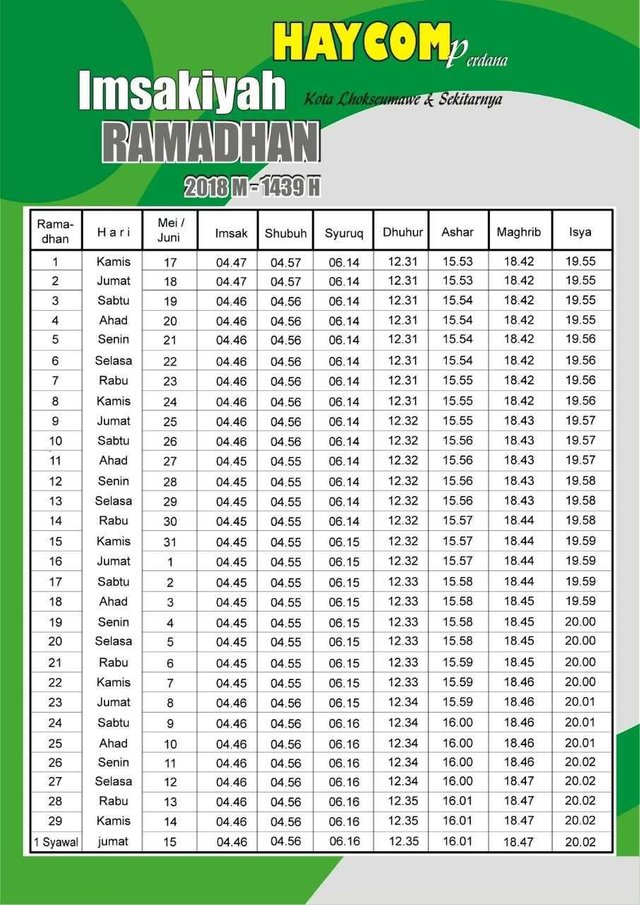
Home »News» IMSAKIYAH RAMADHAN 2018 SCHEDULE (1439 H) ENTIRE CITY IN INDONESIA
SCHEDULE IMSAKIYAH RAMADHAN 2018 (1439 H) ENTIRE CITY IN INDONESIA
Posted by CITIZENSHIP EDUCATION on Friday, May 18, 2018
The term Imsak or Imsakiyah applies both when running fasting obligatory as fasting Ramadan and when running fasting sunna as fast Monday and Thursday. Imsak own meaning is taken from the Arabic language is amsaka yumsiku imsak which means to hold. So, from the sense of restraint, means time of imsak or imsakiyah is the time of commencement to hold everything that break the fast. However, at the time of Imsak still allowed to eat and drink, as long as not entering the time of dawn. In the schedule of prayer is usually listed time imsak, in this sense Imsak or imsakiyah is when someone must start to stop eating meal so as not to be missed until entering the dawn. Imsak here means the meaning of warning or caution.
The timing of imsak or imsakiyah as ihtiyath (prudence) is based on the hadith of the Messenger narrated from Sayyidina Anas: Sayyidina Zaid bin Thabit r.a. said, "We have eaten the meal with the Prophet Saw., then the king got up to pray. Sayyidina Anas asked Sayyidina Zaid, 'How long does it take between the azan (dawn) and the mealtimes?' He replied, 'Worth the time it takes to read 50 verses.' "
Fasting according to language means restraining, self from doing something deed. Meanwhile, according to the term fasting is refrain from all sesatau who break the fast from dawn to sunset with accompanying certain intentions and conditions. Fasting consists of fasting obligatory and fasting sunnah. Fasting must have three namely fasting ramadhan, fasting vows and fasting kifarat.
Fasting Ramadan is a mandatory fast that is done in the month of Ramadan for one month. The law is fardu 'ain for every Muslim who has mukallaf (baligh and sensible). As the word of Allah (swt) means: O you who believe! It is required of you to fast as it was prescribed for those before you, that you may be cautious, (ie) in certain days. Then whosoever of you is sick or on the way (then he breaks), then (shall be obliged for him to fast) as many days as he left on the other days. and it is obligatory for the heavy-handed (if they do not fast) to pay the fidyah, (ie): to feed a poor man. whoever with the willingness to do good, Then That is better for him. and fasting is better for you if ye know (Al-Baqoroh, 183-184)